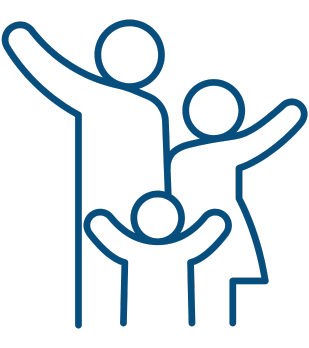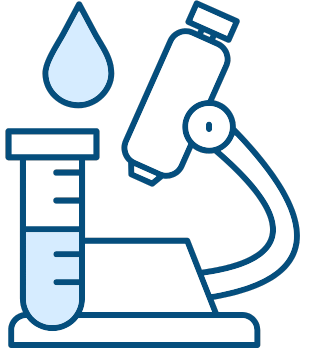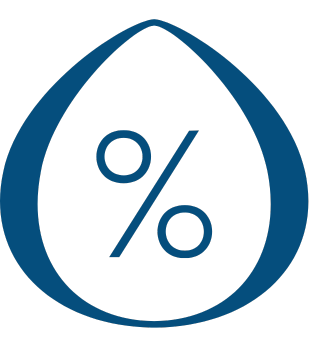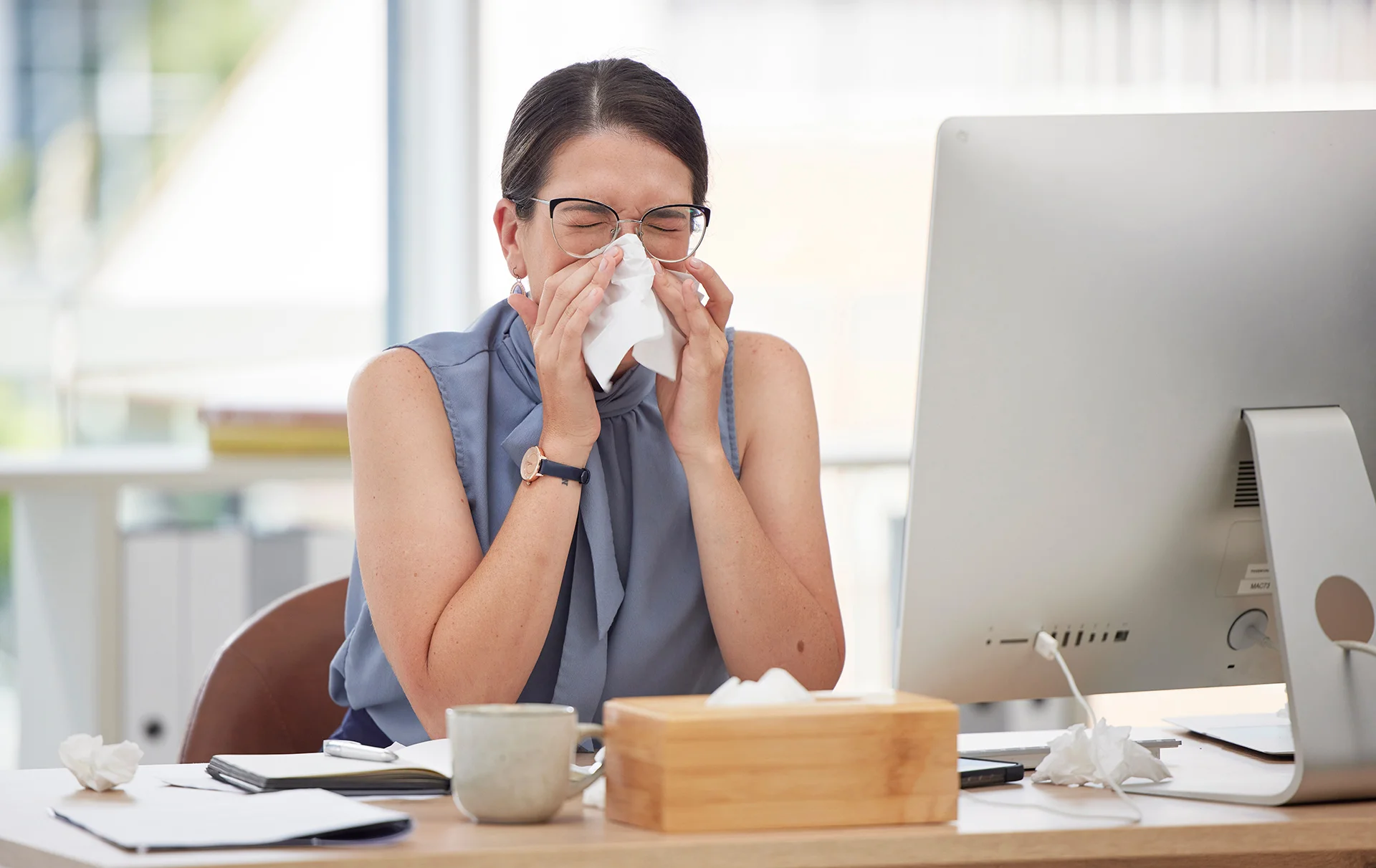When the weather suddenly warms up or cools down, we are often hit by cold symptoms. The common cold is a common, harmless but uncomfortable illness that can occur more than once a season. Most common colds start with a sore throat, runny nose and sneezing, but can be followed by more severe cold symptoms such as fever, cough and general weakness. If you catch a cold, it is important to treat it properly and take preventive measures to prevent relapse or complications.
How to recognise and treat a cold? In this article, together with Drops Clinic Family Clinic specialists, we will introduce you to the common cold, its symptoms, its treatment and the most common reasons why it strikes us so often. We’ll also discuss what to do if you notice the first symptoms and when it’s important to seek medical attention.
Our servicesWhat is a cold?
The common cold is an acute respiratory infection caused by more than 200 different types of viruses. The most common causes of colds are rhinoviruses, coronaviruses or adenoviruses. Cold viruses are spread by airborne droplets or through objects and contact with sick people.
The common cold is the most common infectious disease in the world. The average adult catches the common cold 2-4 times a year. A cold usually lasts a few days to a week, but complications such as sinusitis, bronchitis or pneumonia can arise if proper hygiene and treatment recommendations are not followed.
Causes of colds
Knowing what causes colds is important to avoid frequent colds. Colds can be caused by a variety of factors, but the main cause of colds is a viral infection that affects the lining of the respiratory tract. These viruses are spread by airborne droplets. The viruses enter the body through the nose or mouth and begin to multiply in the respiratory tract. Normally, the immune system reacts to the viruses and helps fight the infection. However, sometimes the immune system is unable to cope with the viruses and they spread further.
Cold weather or sudden changes in temperature, stress, fatigue and weakened immunity increase the risk of catching a cold. To prevent colds, it is important to follow hygiene rules, avoid contact with sick people and strengthen your immune health.
Symptoms of the common cold
Symptoms of the common cold usually appear 1-3 days after infection and last from a few days to a week. Symptoms can vary depending on the type of virus and the individual body’s reaction. The most common cold symptoms include:
- Sore throat. Throat pain can be mild or severe, sometimes accompanied by difficulty swallowing or loss of voice.
- Runny nose or nasal congestion. Constipation can also cause other respiratory problems, as well as a reduction in the sense of smell and taste.
- Sneezing. Sneezing is the body’s way of getting rid of viruses and mucus from the nose and throat.
- Red and watery eyes. Tearing is caused by irritation of the mucous membranes or an allergic reaction.
- Fever or chills. Fever or chills indicate that the body is fighting an infection. Fevers can be both low and high (above 38 °C) and can sometimes lead to dehydration or even convulsions.
- Cough. Coughing can be dry or wet, depending on whether there is a build-up of mucus in the lungs. Coughing can be painful and troublesome, especially at night.
- Headache. Headaches can be both mild and severe. Often associated with sinus inflammation or high blood pressure.
- Muscle and joint pain. Muscle and joint pain can be felt all over the body or in certain areas. It may be caused by fever, dehydration or the immune system’s activity in fighting the disease.
- General weakness and fatigue. A cold can cause general weakness and fatigue, drowsiness, loss of appetite or even mood swings.
What should I do if I notice the first symptoms?
It is important to take the right measures when treating colds to prevent the infection from worsening and complications. At the first sign of a cold, you should take the following measures:
- Drink as much fluid as possible to avoid dehydration and to thin mucus. Water, thyme, raspberry, lime, chamomile tea with honey and lemon, juices or warm broths are best. Avoid alcoholic, caffeinated or carbonated drinks as they can further dry out the body.
- Get enough rest and sleep to recover and help your immune system fight viruses.
- Take medicines for fever, pain and inflammation. However, if you feel well in general and your body temperature is below 38 °C, you should not take fever-reducing medicines. Follow the instructions for the medicines and do not increase the dose without consulting your doctor.
- Use nasal drops or sprays and wash your nose with sea salt solution to relieve nasal congestion and breathing. However, do not use them for more than 3-5 days, as this may only make the symptoms worse.
- Use steam baths or humidify the air at home to relieve sore throats and coughs. You can use a humidifier, an inhaler or just breathe over hot water baths. You can add a little eucalyptus oil to the baths.
- Rinse your throat with saline, calendula, chamomile or sage teas to reduce inflammation and stop bacteria growth.
- Take immune-boosting drugs and vitamins such as vitamin C and zinc. Do not exceed recommended doses.
When should I see a doctor?
Colds usually go away on their own with the right treatment and do not require medical intervention. Many of us know how to treat colds and do not go to the doctor. However, there are times when a cold can be a sign of a more serious illness or cause complications that require urgent medical intervention. Contact your family doctor immediately if you:
- Fever lasts longer than 3 days or is very high (above 38.5°C).
- Symptoms last more than 10 days or get worse.
- Cough is severe, dry or with blood.
- Greenish or yellow secretions and a severe headache accompany the runny nose.
- You feel pain or pressure in the chest or difficulty breathing.
- You feel pain or swelling in the face.
- You feel pain in your ear or hear noise in your ears.
- You are expecting, over 65 years old, or have a chronic disease such as diabetes, asthma or heart problems.
A doctor’s consultation is useful even before such acute symptoms appear. Every cold can be individual and your doctor will advise you on how to treat your cold properly, based on your case.
Cold treatment – intravenous therapy
Although colds are usually treated at home, sometimes an effective and quick way to treat a cold may be needed. How to beat a cold quickly? One way is intravenous therapy, also known as drip therapy.
Intravenous therapy is a method of treatment in which medicines or fluids are injected directly into a vein through a special catheter. This method allows you to reach the exact source of the disease by using the right concentration of the drug in the blood. This way you can quickly get over a cold, get rid of cold symptoms and improve your body’s condition.
Intravenous therapy is a useful and excellent way to treat the common cold because:
- The droplets help to quickly reduce fever and pain.
- The droplets help to balance the body’s fluid levels and thin mucus.
- The droplets help to strengthen immunity and fight viruses.
- Droplets help prevent complications and bacterial infections.
- The drops help to improve overall immune well-being and energy levels.
Intravenous therapy is a cocktail of drugs and vitamins that are infused into the body to reduce fatigue, boost immunity, restore fluid levels and energy, and help your body fight viruses and bacteria.
Intravenous therapy is a safe and reliable treatment under the supervision of qualified medical professionals. Intravenous therapy usually lasts between 30 minutes and a few hours and usually does not cause any side effects.
Ways to prevent colds
The common cold is a difficult disease to avoid because viruses are constantly mutating and spreading. However, there are several ways to protect yourself from the common cold, protect others from infection and reduce the risk of complications. Use these preventive measures to avoid frequent colds:
- Wash your hands frequently and thoroughly with soap and water. Use hand sanitisers. This will help prevent viruses from entering your body through your nose or mouth. Handwashing is especially important before meals, after visiting public places or after contact with sick people.
- Avoid contact with sick people and do not touch objects that may be contaminated with viruses. If you are sick, keep your distance from other people and cover your mouth and nose when sneezing or coughing. Also use disposable handkerchiefs or cloths and dispose of them properly. If you can, stay at home until you are better to avoid spreading the infection to others.
- Strengthen your immunity with a healthy diet, adequate fluid intake, regular physical activity and sufficient rest and sleep. You can also take immune-boosting drugs or vitamins if you feel you are lacking them or during cold season. A healthy diet should include plenty of fruit and vegetables, which are rich in vitamins and antioxidants, especially vitamin C. Fluids help to maintain the right amount of fluid in the body and promote mucus secretion. Physical activity improves blood circulation and the immune system. Rest and sleep allow the body to recover and maintain proper functioning.
- Get vaccinated against flu and other illnesses that can cause cold symptoms or complications. Vaccination is especially recommended for people at risk, such as children, the elderly, pregnant women or people with chronic illnesses. Vaccination can be given every year during the flu season or at any time on the advice of a doctor. Vaccination helps to reduce the severity of the illness and the likelihood of complications.
- Follow a healthy lifestyle and avoid smoking, alcohol and drugs. These factors can weaken your immunity and increase your risk of catching a cold. Smoking damages the lining of the respiratory tract and reduces the body’s ability to fight infection. Alcohol dehydrates the body and suppresses the immune system.
- Follow a course of vitamin therapy or ozone treatments. As the seasons change, the amount of vitamins in the body becomes insufficient to maintain proper immune function, so it is important to take extra vitamins. If you forget to take your vitamins for an extended period of time, or if you feel that the vitamins you are taking are not having the effect you expect, vitamin drip therapy is a great and quick way to boost immunity.
By following these simple tips, you can significantly reduce your risk of catching a cold and at the same time improve your quality of life.
The common cold is a common illness that can be caused by various viruses. Most of the time, the symptoms of the common cold are not intense. Colds are manifested by sore throat, runny nose, sneezing and fever. Colds usually clear up within a few days, but complications can arise if proper hygiene and treatment recommendations are not followed. Colds can be treated at home or with intravenous therapy, which is an effective and quick way of treating colds. You can prevent colds by taking certain preventive measures, such as frequent hand washing, avoiding contact with sick people, boosting your immunity and getting a flu vaccination.If you catch a cold, the expert team of doctors at Drops Clinic is here to help. Our doctors will examine you, prescribe the right course of treatment and help you get back on your feet quickly.




